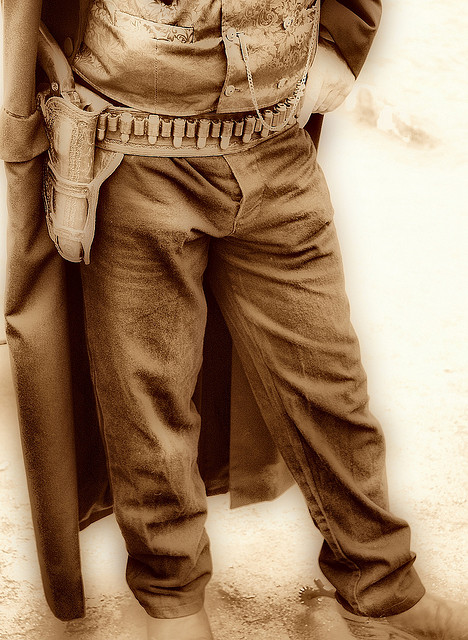"[...] I'll die a man!...Give me my guns."
Silently she went into the house, to return with a heavy cartridge-belt and gun-filled sheath and a long rifle; these she handed to him, and as he buckled on the belt she stood before him in silent eloquence. (Grey)
In this passage from Zane Grey's Riders of the Purple Sage it is clear that guns symbolise masculinity but, Jane Tompkins notes, "even though the gun is obviously a symbol for the penis, manhood, in this scenario, does not express itself sexually. Violence is what breaks out when men get guns" (33). Later she adds that, in Westerns, "the ultimate loss of [...] control takes place when one man puts holes in another man's body" (56). For obvious reasons, that state of affairs generally wouldn't be deemed wholly satisfactory in a romance novel.
That's why I found Ruth Jean Dale's use of gun symbolism particularly interesting. Legend! is a Western romance, and Dale seems well aware that the gun can function as a phallic symbol. I'll begin with a scene in which Rose, the heroine, tries to confiscate the hero's gun and instead receives a lesson in sexual desire:
Glaring into his face, she reached out with her left hand and pulled his pistol from its holster. The weight of it dragged her arm down to her side but she had it, she thought triumphantly. [...]
Yanking her hard against his chest, [...] holding her by the upper arms, he brought his mouth down on hers. Stunned, she felt the pressure of his chest against her breasts and the corded muscle of his thighs against her legs, and then she forgot all those peripheral distractions before the onslaught of sensations originating at that point where his mouth joined with hers.
It was a fast, hard kiss meant to punish, and in that it failed miserably. Too surprised to resist, Rose hung suspended like a rag doll. A devastating rush of excitement shot through her from the tips of her toes to the roots of her hair and all points in between, leaving fire in its wake. This was a kiss? She'd had no idea! [...]
Boone leaned forward and slipped his pistol from Rose's numb grip. Flipping it over his hand, he settled it snugly into his holster. (84-85)
Replaying the scene in a dream, Rose transposes its location from the marshal's office to the local saloon, where the town whore plies her trade upstairs:
He stood at the foot of the stairs leading up to a second floor obscured by swirling smoke or fog - Rose couldn't be sure which. He did not move so much as a muscle, didn't lift his hand to beckon her, yet she felt his pull as strongly as if he'd dropped a loop over her shoulders and was hauling her in like a calf at roundup.
She had no choice. Or did she? His holster was empty; she held his pistol in her hand but this time it was light and warm to her touch, not heavy and cold and awkward as it had been in the marshal's office. She could do anything she wanted with it, she realized [...]. She held his fate ... and her own ... in her hands. [...]
She followed his lead willingly, anticipation surging through her as they ascended to ... what?
Rose sat bolt upright in her bed, trembling, her cotton nightgown clinging to a body damp with perspiration. Shame clogged her throat, shame at her own weakness - she'd succumbed to the man even in her sleep! But mixed with the shame was also fear, fear that she would never know what bliss might have awaited her at the top of those stairs. (90-91)
 I don't think you need to be Freud to work out the symbolism of that warm pistol but if it still wasn't clear, there's a rather obvious clue in Boone's statement that "I never hired out my gun to the highest bidder. That to a man is like whorin' to a woman - the end of the line" (218).
I don't think you need to be Freud to work out the symbolism of that warm pistol but if it still wasn't clear, there's a rather obvious clue in Boone's statement that "I never hired out my gun to the highest bidder. That to a man is like whorin' to a woman - the end of the line" (218).
Given Boone's reputation as a gunslinger it seems as though he may use his gun in Rose's service (literally and metaphorically), but not settle down to a permanent relationship with her. Dale resolves the problem by having Boone relinquish his "gun belt and revolver. He has no further use for them in the new life we hope to build together" (279): only when the symbol of violent, destructive masculinity is relinquished can Boone adopt a new, sexual and reproductive, model of manhood of the kind celebrated in popular romance.
---------
Dale, Ruth Jean. Legend! 1993. Richmond, Surrey: Harlequin Mills & Boon, 1997.
Grey, Zane. Riders of the Purple Sage. Project Gutenberg Australia.
Tompkins, Jane. West of Everything: The Inner Lives of Westerns. New York: Oxford UP, 1992.
The image of the gun and gunbelt slung round someone's waist was created by theexbrit who made it available at Flickr under a creative commons licence.
